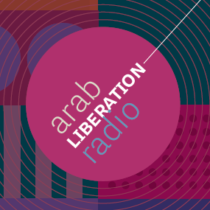Magazine

Arab Liberation Radio
For 25 years, Radio Tahrir aired interviews with writers, musicians, academics and others—all Arab or Arab American—and became a vital resource for listeners in the New York Region. With archives housed at the Bentley, these interviews can now be heard around the world.
By Katie Vloet
These are some of the sounds of a quarter-century of audio from Radio Tahrir. It started like this, on June 13, 1989: “We’ll begin this afternoon’s program with an interview, which I recorded three months ago in Damascus, Syria, with Ghaleb Halasa, an Arabic novelist and literary critic,” Dr. B. Nimri Aziz intoned on the initial program aired through Radio Tahrir.
With that, she established the framework for a project designed to articulate lesser-known but richer sounds and images of the Arab and Arab American worlds. Radio Tahrir, which aired on the Pacifica Foundation-owned WBAI station in New York City, would grow to become an essential outlet for the voices of Arab people living in the United States and abroad.
“I looked around to see what was being published and broadcast about our people in the United States. There was nothing on TV. Radio productions were either political analysis or oriental music,” says Dr. Aziz, Radio Tahrir’s originator, host, and producer.
She saw a clear need for a different point of view. “I’m an anthropologist. I understood the diversity of our culture and how politics can subsume everything; as a result, there’s a cultural dimension presented about a people,” she says. “I felt I could introduce a positive, deep dimension that was generally unavailable to the public.”
A Forever Home
Sally Howell was aware of Radio Tahrir as a significant forum for Arab intellectuals, as well as Arab American artists. A U-M faculty member, she was also aware of the skill with which the Bentley Historical Library’s archivists handled donated material, and she believed it would be the perfect home for the program’s recordings.
“I was very eager for us to bring it to Michigan. We have these conglomerations of scholars. We have one of the oldest and strongest Middle East-focused programs here, with language, and Islamic studies, and so much more,” says Howell, associate professor of history and director of the Center for Arab American Studies at the University of Michigan-Dearborn.
U-M’s main campus includes a Middle East Studies Department, an Arab language field of study, and an active Arab Student Association. The Department of American Culture offers many courses in Arab and Muslim American Studies, including those that focus on art, culture, activism, literature, cinema, feminism, and more. One class is called “Camels, Kabobs, and Khalil Gibran: Arab American Cultural Studies.”
Given U-M’s rich representation of Arab cultures in and out of the classroom, Howell encouraged Dr. Aziz to donate her 25 years of Radio Tahrir recordings to the Bentley Historical Library.
 The collection is now available online through the Bentley’s digital archives. In one show, a mother broadcasts a message to her imprisoned son. On another installment, scholars discuss Huda Sharawi, an early leader of Egypt’s women’s movement. A Kuwaiti printmaker and painter speaks about her art. U.S. bombings are discussed from the point of view of people who live in Arab countries.
The collection is now available online through the Bentley’s digital archives. In one show, a mother broadcasts a message to her imprisoned son. On another installment, scholars discuss Huda Sharawi, an early leader of Egypt’s women’s movement. A Kuwaiti printmaker and painter speaks about her art. U.S. bombings are discussed from the point of view of people who live in Arab countries.
Literature, sculpture, film—all art forms found a home on Radio Tahrir. “I think this is going to be a great resource for scholars of Arab American literature in particular, but also people who are interested in those trans-national ties that connect people across hemispheres,” Howell says. Dr. Aziz “is also a skilled interviewer. Her style is so relaxed, and she doesn’t shy away from the hard questions.”
In the beginning, it was challenging to find guests with whom she could conduct engaging interviews or ask hard questions, Dr. Aziz recalls. “One had to dig,” she says. The reputation of Radio Tahrir—a word that means “liberation”— grew in those early years, and soon potential guests were eager to be part of it. Aziz became what the poet Naomi Shihab Nye describes as “the human switchboard among poets.”
“After maybe three years of broadcasting, other Arabs heard us and were excited to be interviewed,” Dr. Aziz says. “They wanted to talk about something other than political crises.”
By and For an Arab American Audience
Many of the guests on the show were Arab or Arab American though, gradually, as the program developed, it attracted Muslim Arabs as well as Muslims who were not Arab. Many had connections to U-M, including poet Lawrence Joseph (B.A. ’70, J.D. ’75) and poet Khaled Mattawa, now a professor of English Language and Literature at U-M. Dr. Aziz interviewed guests in the United States and during her journalistic assignments in the Middle East.
Dr. Aziz thought it was important that the production staff who worked on Radio Tahrir were of Arab descent. “We Arab Americans had been largely dependent on non-Arab producers. I insisted we be an Arab production center,” Dr. Aziz says.
“We are, after all, the best authorities concerning our own culture and lives.”
Her colleagues at Pacifica’s New York studio were supportive. “Many of them are African Americans, and they understand how a biased media can misrepresent an issue to the public,” Dr. Aziz recalls. “I had that moral support to tell the stories I knew and that were lacking, or hard to find, in the public sphere.”
These stories included discussions of Arab American comedy festivals, a Ramadan recitation by a schoolgirl, socioeconomic issues in Algeria, reports on a Cairo anti-war conference, and poems by New York schoolchildren about the 1991 Iraq war. The range of topics was rich, and it showed the depth and breadth of the ways Arab Americans lived their lives.
That wide range had an impact on listeners, and on people who worked for the program. Dr. Aziz recalls one volunteer at Radio Tahrir saying what a relief it was to work at a place that told the full story of Arab American lives. It was a safe space, the volunteer said, where they wouldn’t be asked about their losses or victimization.
Countering “Hollywood’s Verdict on Arabs”
When Hollywood needs villains, people who are Arab or Muslim are often the easy solution, author Jack Shaheen said on one episode of Radio Tahrir. Shaheen had examined some 1,000 films and written about his findings in Reel Bad Arabs and Guilty: Hollywood’s Verdict on Arabs After 9/11.
“This stereotype—Arab equals the evil, godless, cultural other, someone who is different, someone who is a threat to civilized people—has been (around) for more than a century,” Shaheen said in the Radio Tahrir interview. Other groups are villainized and stereotyped, he said, “but never for this long.”
“The Hollywood Arab, is the TV Arab, is the comic book Arab, is the video game Arab,” Shaheen said during the interview. “There are all too few voices who step to the platform and condemn it for being racist. We’ve grown accustomed to this symbology.”

Shaheen cited the Arab-Israeli conflict as one reason for this portrayal. Hollywood also became comfortable with “vilifying Muslims,” he said, and has often equated Arab people and Muslims—even though only about 20 percent of the world’s Muslims live in Arab countries.
Dr. Aziz points out that the Western view of the Arab world grew “overwhelmingly negative” after the 1979 revolution in Iran that overthrew the monarchy and established the Islamic Republic. Following September 11, 2001, she says, “we faced a new, more severe era of anti-Arab and anti-Muslim sentiment across the United States.”
Radio Tahrir provided a platform to counter that sentiment and to tell different stories than network news shows were airing at the time. One segment in early 2002, for instance, highlighted the “Post-911 detention of Muslim Americans on minor immigration violations.”
“We had to say, ‘wait a minute, there’s another story to tell,’” Dr. Aziz says.
The Legacy of Radio Tahrir
Radio Tahrir was the first radio program in the United States to focus on a wide range of topics pertaining to different Arab and Muslim communities across the world and, as far as Dr. Aziz is aware, it has not been duplicated.
She and her fellow producers are proud of Radio Tahrir’s “contribution to American history, spoken by us—Arab Americans—in our own words. . . . These productions also represent a positive, creative tie between Arabs in the U.S. and Arabs abroad.”
As the co-founder and former executive director of RAWI (Radius of Arab American Writers Inc.), Dr. Aziz has expanded her commitment to the community by promoting Arab writers articulating Arab experiences and perspectives through their memoirs, novels, and poetry. “These talented writers needed each other too,” she says.
Another part of Radio Tahrir’s legacy is the success of people who worked on the program. One of those is Tamara Issak, Ph.D., who was a contributing producer and host. Now an assistant professor at St. John’s University, her research focuses in part on Islamophobia. She says the Tahrir archive provides critical insights into the social, cultural, and political environment of Arabs and Muslims in the United States and abroad in the past few decades.
Long before the podcasting era, she says, Tahrir was live on the air weekly and sometimes daily in New York City on the FM dial, giving Arab and Muslim voices a place to frame conversations and discuss their views on contemporary issues.
“It was a forum for our communities and by our communities, and it was groundbreaking in that it spoke directly to Arab and Muslim communities and addressed our most pressing issues,” Issak says. “Many world-renowned writers, artists, musicians, and activists were interviewed on Tahrir when they were starting out. Listening to these archival interviews will give researchers and those interested many insights into the early inspiration for their work.”
